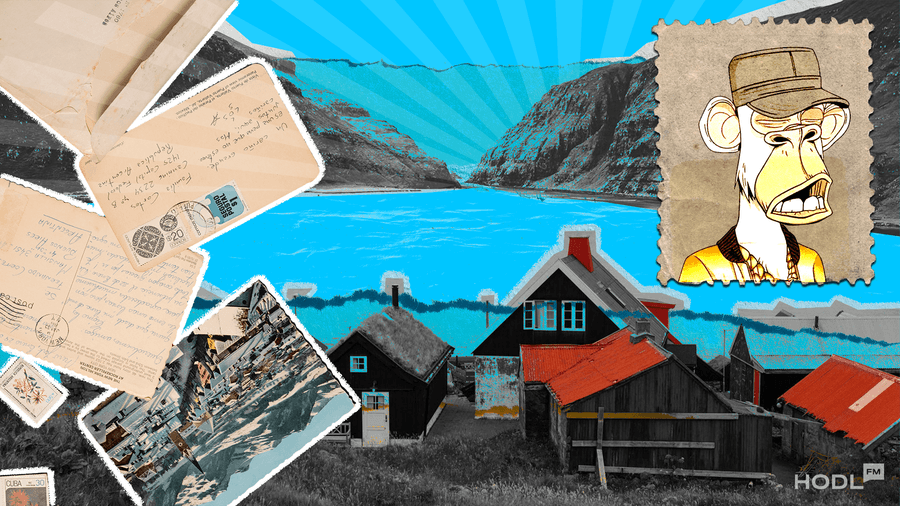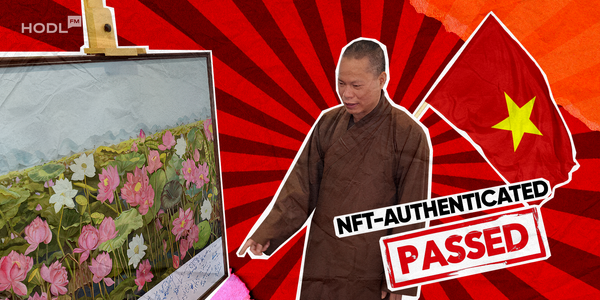The Faroe Island Postal Service has given Philately (don’t rush to Google the word if you’re a millennial) – the collection and study of postage stamps – an invigorative shot in the arm. In an incredible merging of state-of-the-art blockchain technology and old-style postage, Posta Faroe Islands, the region’s official postage issuer, has introduced a cutting-edge series of “crypto stamps.”
It may too early to tell whether the fat lady will sing on this venture. Still, the June 23 announcement of the collaboration with VariusSystems is a ground-breaking moment in adopting blockchain and NFTs within the postal industry. Per the official statement, the debut collection of stamps has been dubbed “Stamps of Maybe,” and is linked to Veurstova Froya, the Faroese Weather Station.
The unique combination allows physical stamps to have their digital version stored on the blockchain will preserve their functionality as genuine postage, thus and enhance the stamps’ rarity and desirability. Speaking during the United Nations Universal Postal Union summit, VariusSystems CEO Michael Dorner said there was increased interest globally in exploring innovative applications of emerging technologies. He said:
“We felt an enormous interest not only in the NFT stamps but in blockchain technology […] and how this digital revolution with decentralized blockchains can help their businesses grow and stay ahead of the curve.”
“Each stamp features its own distinctive bouquet, carefully crafted to encompass the flowers, plants, birds, and animals that symbolize the essence of each season on our islands. The Faroese people have always shared a deep connection with nature and its abundant resources, which is why many of these flowers and animals have become national symbols in our music and art. In fact, our traditional national costume proudly showcases embroidered representations of these flowers, often on black or dark tones of fabric” .
Heiðrik á Heygum
Understanding NFTs
NFTs have become the buzzword in the crypto sphere for the last few years and have continued to be popular by providing a way to authenticate ownership of digital assets. However, the recent emergence of NFTs for stamp collections is fast gaining traction and threatening to challenge the traditional ordinals. Like other NFTs, NFT stamps are created and traded on the blockchain and become a one-of-a-kind art piece that cannot be duplicated on replicated. NFTs provide opportunities for most industries, from sports, consumer goods and retail, to change how they engage with their audiences, add value to existing products, develop new business models and tap into new markets.
Faroe Islands Postal Service
The Faroe Islands, a group of volcanic islands in the North Atlantic Ocean, have been self-governing of Denmark since 1948. The Island nation’s philatelic history dates back to the 1860s, and postage stamps, which have been used for mail in the Faroe Islands, are part of its postal history. Collecting the Faroe Islands postage stamps provides years of fun and learning, beginning in 1975 when the new postal service took over the Island’s postal services.
Issuing NFT Stamps
The Faroe Islands’ foray into blockchain-based crypto stamps follows in the footsteps of other postal services like Austria’s PostAG that have integrated blockchain and philately. This postal industry innovation leverages the Ethereum blockchain to create unique NFT stamps that redefine the traditional concept of stamp collecting.
The digital revolution coincides with the seeming decline of philately. What with a new generation increasingly preoccupied with flashy screens and a stream of dopamine served by the likes of Twitter, Instagram, TikTok and other social media platforms? The transition from ordinary to e-philately via NFT stamps intends to increase international sales.
By initiating e-philately, the Faroe Islands Postal Service trains offers more than the traditional aspect of the postal system because philately has cultural ties that connect communities with operators. It may sound unbelievable to the uninitiated, especially the millennial. Still, your brain can build connections that can create an intellectual or emotional bond with digital stuff.
Every NFT stamp will be minted with its unique level of scarcity with an individual constituent that makes up a collectable set. This includes a selection of some super rare NFT stamps with enhanced value characteristics. Every NFT stamp has a digital signature to verify ownership and authenticity. And since they’re non-fungible, each will be a one-of-a-kind digital item.

Collectors will buy a physical stamp with a unique code that they can scan to receive their NFT. Why would a sane person buy any of these? Of course, it’s the design and for others it’s the value their unique NFT could get in the future. Is this a hocus pocus gimmick for anyone to try and make money, not really, statistics show that usually, the less NFT stamps issued, the greater the value.

Implications and Impact
The introduction of NFT stamps has everything it takes to become a catalyst for business growth and stay ahead of the digital revolution curve. While they may not look like birds of a feather, NFTs and stamps share properties such as valuable financial tools or vehicles of artistic expression. Moreover, they both have avid collector bases that propel the rarest among them to multi-million dollar price tags.
By complementing physical stamps and offering them a digital layer of authentication and security, NFT stamps are already making their mark in the postal industry. For an industry that rakes hundreds of billions annually in revenue, NFT stamps have the potential to drastically improve the existing potage infrastructure and propel it faster towards digitalization.
Conclusion
For skeptics, the move by Faroe Island Postal Service to embrace crypto collectibles is a close ally in the infamous Dutch Tulip mania. However, the two are completely different beasts. Stamps have already endured a longer life cycle. As the scope and technology behind NFTs disrupt the postal service industry, NFTs will lend prominence to philatelic collections. NFT stamps enable official postal authorities to recreate themselves and attract new digital art collectors who never interacted with real stamps.



